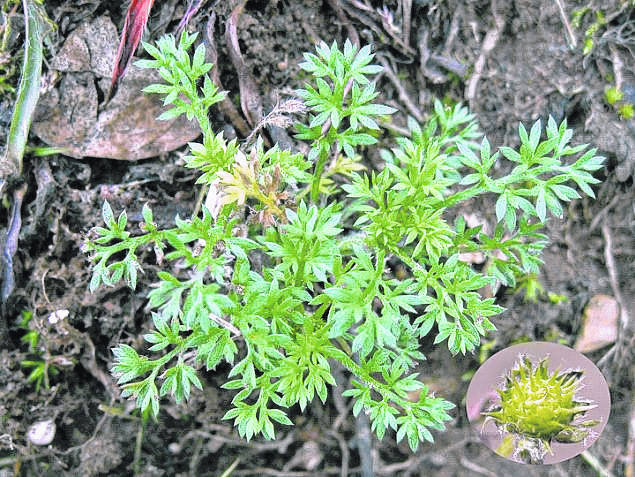Lawn burweed (Salvia sessilis), is an especially thorny nuisance in winter lawns. While we look may think nothing of stepping barefoot through the cool green spring grass – cleverly avoiding fire ant mounds – we overlook the small, thorny, seeds of the lawn burweed, but you will feel them!
Lawn burrweed, also called spurweed, stickerweed, is a common turf weed easily identified by its low ferny foliage that resembles parsley, and sharp, spine-tipped burs that develop along the leaf axis. Look for lobed, sparsely hairy leaves with an opposite arrangement along the stem. This is a winter annual weed that germinates in thin turf . It is small, low growing, and inconspicuous during the winter months. This year’s weeds germinated in Fall, will grow through the winter, flower, set seed in spring. Plants will then die as temperatures warm up in April and May, but not before leaving spiny seeds to plague our tender toes.
To control lawn burweed, select post-emergent herbicides can be applied between December-February. Using herbicides to kill young weeds will not only manage this year’s weeds but also reduce the future seed bank in the soil.
Herbicides available to homeowners that will control lawn burweed while not harming turf grasses contain the active ingredient, atrazine, or a combination of the three active ingredients 2,4-D, mecoprop, and dicamba. The latter product is referred to as a three-way spray and is commonly available under several brand names like Weed-B-Gone, Lesco Three Way, or Speed Zone Southern. Care must be taken when using products containing 2,4-D on centipede and St. Augustine lawns, which are sensitive to this active ingredient. Check the product label for recommended rates for these grasses.
Cultural control, like maintaining a dense, healthy lawn is another way to combat this and other weeds. Cooperative Extension offers soil testing for lawns which will provide lime and fertilizer recommendations for your specific site. Healthy turf can outcompete lawn burweed for light, water, and nutrients, thereby reducing the infestation.

